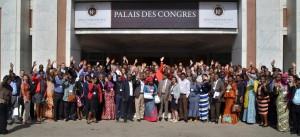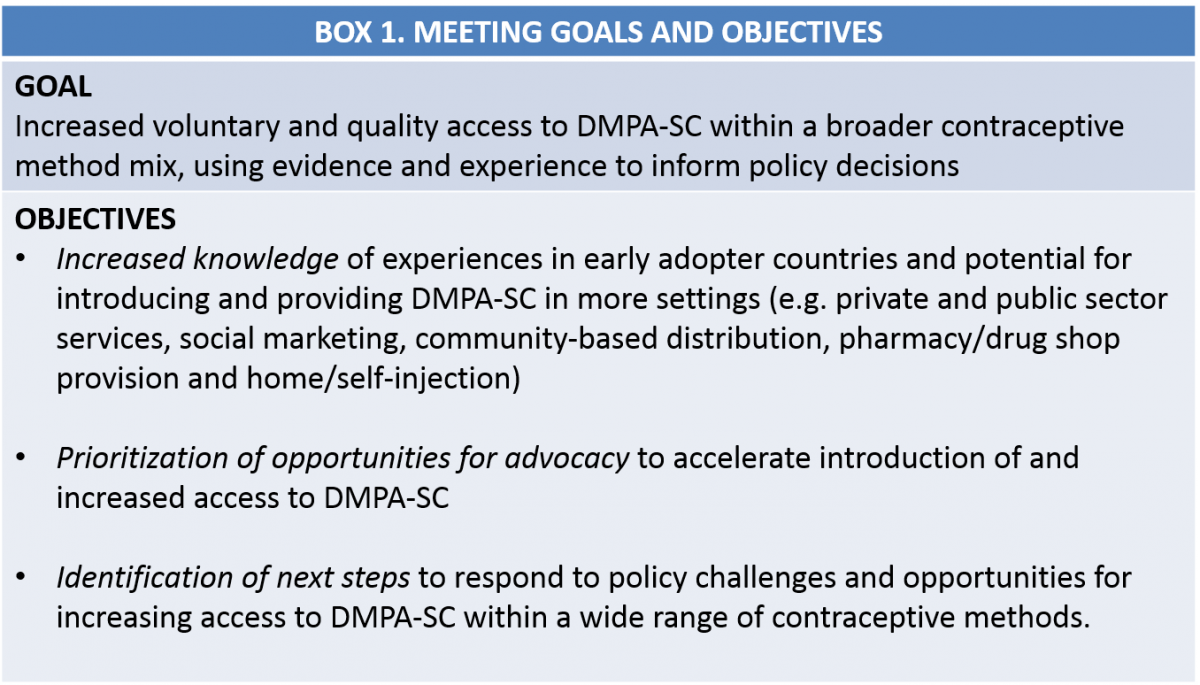
EVIDENCE AND ADVOCACY IN ACTION
Last month, 150 researchers, health professionals, advocates, and donors from 19 countries met in Dakar, Senegal for three days to strategize about how best to introduce and increase access to subcutaneous depo provera via Uniject, also known as DMPA-SC or Sayana Press. The Advance Family Planning (AFP) initiative co-organized the meeting in collaboration with PATH and IntraHealth, along with a global steering group of international non-governmental organizations and in-country partners.
Research on the safety, efficacy and acceptability of DMPA-SC indicates that its availability will improve women’s access to injectable contraceptives through means such as community-based health workers, private clinics and pharmacies, and home/self-injection. Evidence from early adopters of DMPA-SC in a number of countries and settings suggests that it is now time to learn from and accelerate their experiences—key objectives of the meeting (see Box 1).

“Thinking about what women need, want, and are best able to access in terms of contraception was at the heart of the meeting,” said Beth Fredrick, Executive Director of AFP. “Though DMPA-SC is only one method among many, its potential for improving access was clear.”
Each of the African and Asian countries represented[1] left the meeting with objectives specific to policy changes needed and an initial plan for engaging decision-makers. Within a week of the meeting, Kenya and Nigeria had convened policymakers and others in their country to chart a course for increasing access to DMPA-SC.
Despite the diversity of countries represented, each saw the potential of DMPA-SC for overcoming barriers to contraceptive access and relieving the health system through alternative channels of provision. Also standing ready to support country-led efforts were donors: the U.S. Agency for International Development, the UK Department for International Development, the Bill & Melinda Gates Foundation, Children’s Investment Fund Foundation, The William and Flora Hewlett Foundation, the David and Lucile Packard Foundation, and the United Nations Population Fund. Support for planning the meeting, provided by TJ Mather, was matched two to one by cost-sharing from other organizations and donors.
Initially, the three co-organizers conceived a much smaller meeting. Interest in DMPA-SC soon outstripped those plans. A global steering group of 40 members shared in the planning and development of a focused agenda that prioritized the ability of countries to learn from one another through candid exchange of evidence and experience.
The co-organizers supported the outcomes of the meeting in two specific ways:
- Planning and advocacy. Along with PATH, AFP reached out to international non-governmental organizations and in-country partners to assess how ready countries were to introduce and increase access to DMPA-SC. IntraHealth helped manage on-the-ground logistics. AFP’s advocacy partners facilitated use of the AFP SMART approach to set priorities and implement advocacy strategies after the meeting.
- Policy-relevant evidence. PATH mobilized its own resources and independent funding to prepare a suite of materials, summarizing the current state of knowledge. These materials ensured that all participants shared a basic understanding of the method and the policy issues that would be amenable to evidence-based advocacy. In addition, PMA2020 data helped inform objective setting for Burkina Faso, the Democratic Republic of the Congo, and Nigeria.
Follow-up activities from the meeting will be taken on through the Opportunity Fund—a small grants program managed by PAI with funding from AFP.
View resource and materials from the meeting here. View the meeting report here.
[1] Bangladesh, Benin, Burkina Faso, Cote d'Ivoire, Democratic Republic of the Congo, Ghana, Guinea, India, Kenya, Madagascar, Malawi, Mali, Niger, Nigeria, Senegal, Uganda, United Kingdom, United States, and Zambia.

